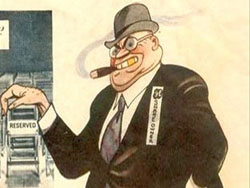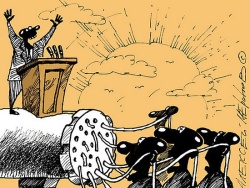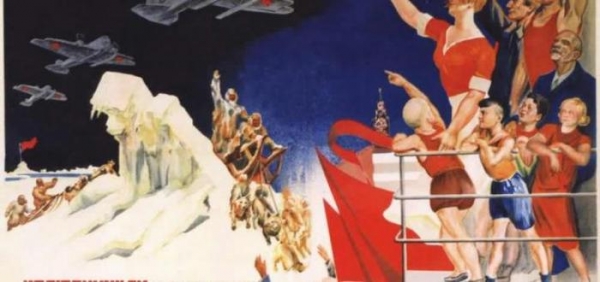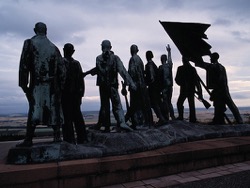
Recently in leftist circles there is a debate about “national” and “comprador” capital in relation to today’s world in General and Russia in particular. The relevance of the dispute is determined primarily by the fact that in these categories is substantiated or that attitude to the current authorities and opposition forces in different directions (on the one hand, the liberal Pro-Western, with other national – and social-Patriotic).
Those who answers the title question in the affirmative, indicate the growing contradictions between the ruling bloc and the most aggressive circles of world imperialism, the danger of disintegration of Russia as a unified state, which would lose in the first place the working people. In this regard, they consider that the struggle of national bourgeois forces against compradora at this stage has historical justification.
Their opponents cite the fact that actually the national capital in our time any more does not remain: all large capital to some extent associated with transnational capital, is associated with him by relations of financial, technological and other dependence, and, therefore, expect him to be nationally oriented policy is naive. In relation to today’s Russia they believe that strengthening “powers” actually means the strengthening of a raw material appendage of imperialism and does not have any progressive content.
In my opinion, the theoretical basis of both the declared positions inadequate to the modern age and the inevitable collision with reality is fraught for supporters of new disappointments and ideological crises. To understand, as is the case in reality, it is worth remembering the history of these concepts and related phenomena.
The terms “national capital” and “comprador capital” came into use Communist movement almost 100 years ago. They first appeared in the documents of the Comintern in the period of the Chinese revolution of the 20th, when the opponents of semi-colonial dependence on foreign imperialism headed by sun Yat-Sen founded the Kuomintang party. In the Comintern it was concluded that it is party of the “national bourgeoisie” was able to act, albeit inconsistently, against imperialism and its domestic props — “comprador bourgeoisie” (the Spanish-Portuguese word comprador literally means “wholesale buyer”). In these categories, the imperialist capital was seen as external to the country factor, in contradiction with all the powers, represents the trend of independent development of capitalism on the basis of the national market. Hence it logically followed that at the stage of national liberation is an objective Union of the labor movement to the national bourgeoisie.
Under the influence of the authority of the Comintern both terms have been widely applied to other countries, including Latin American. This approach has long been criticized by many Marxists, rightly remarked that the Latin American countries differed from Asian and African a higher level of capitalist development, a long-standing involvement in the international capitalist division of labour, and deep integration of imperialist capital in the internal socio-economic structure, the combination of economic dependence with political sovereignty (the latter was emphasised by Lenin in “Imperialism, the highest stage of capitalism”, which this year marks 100 years old).
With 70-ies of XX century, like Latin, had become common throughout the dependent periphery of the capitalist world. A dominant force in the world capitalist economy and politics have become transnational corporations, acting primarily not as an external factor, and how inherent socio-economic structure of each country’s part of the process of capitalist production, as domestic as it is international. Thus transnational capital has reached a new level of real socialization of production, and what seems to me to be the main objective reason for the victory of imperialism over socialism early in the twentieth century.
Of course, today there are reimperialization contradictions. However, when enormously increased the real socialization of production and the internationalization of all public life, the intertwining of transnational monopoly capital cannot be broken. Further consolidation of the structure of global domination of transnational capital is reflected in the creation of the “Pacific partnership” — the world’s largest “free trade and investment” between the United States, Canada, and countries in East Asia and Latin America, plus secret from the peoples of negotiations on establishing a similar “zone” between the EU and North America.
Submission to those who seek for their own subjective anti-imperialism only national-Patriotic basis, in these circumstances, hang in the air. Capital “national” in the old sense — is targeted mainly on their national market, protected by him and his government from the competition of foreign capital as an external factor in the new historical conditions may no longer exist. “Comprador” capital as mediator between foreign capital and imperialist country, where the latter is introduced from outside, also belonged to the past. Thus, theoretically right, those who criticized the application of concepts of national and comprador capital to the present.
However, a major disadvantage of both sides of the debate appears to be their General focus on Russia as the country restored capitalism, included in the capitalist world. Existence in the modern world, the socialist countries, if recognized, not affect the essence of the approach. The result is the misunderstood nature of global conflict, spanning the planet (according to some, have already reached the stage world war). Often this conflict is attributed reimperialization the content of the same type that a hundred years ago, but this is hardly compatible with dialectics, because Heraclitus 2500 years ago taught that you cannot step twice into the same water. If the content of the conflict historically different, how? Those who are not able to answer this question, one thing remains: yesterday, look forward to that opposing imperialist aggressor forces from Venezuela to Donbass will raise red flags and establish the dictatorship of the proletariat, and today, bitterly disappointed and to see them as no more than representatives of bourgeois nationalism or social democracy. Here only I do not remember when that world imperialism (imperialism and world) so irreconcilable battled really bourgeois nationalists or actual social Democrats…
Apparently, the situation is more complicated than it seems all around the terms the day before yesterday. We do not live in a uniformly capitalist world where find out the relationship between different “national imperialism”, and in a world where there is a struggle between two powerful international forces organized, from the progress and outcome of which depend on the direction and prospects of the development of mankind. On the surface it looks like a confrontation between neo-liberalism made in USA, aspiring to global domination, and camp “multipolar world”. The latter encompasses power is very different, sometimes even yesterday opposing each other: from the East Asian countries under the red flag to the winners of the “Communist totalitarianism” under the tricolor or the Orthodox banners; from chavistas who dreams of socialism of the XXI century, to the Teheran of the ayatollahs. Followers of most of these trends can be found in the ranks of anti-globalization demonstrators on the barricades of Donetsk, Barcelona, Istanbul… What is behind this is pure opportunistic connection incompatible or objectively common “denominator”?
It is clear that we are not talking about a frontal confrontation of socialism and capitalism, revolution and counter-revolution (as we would not want to). Even Che Guevara correctly said to be a revolutionary, you need at least the existence of the revolution. The modern world is experiencing an era if not a total response, the rollback of social progress after the completion of the greatest in the history of the revolutionary epoch that engulfed most of the twentieth century.
The global system of modern imperialism economically submitted transnational financial capital, with its international bodies. It is a single complex, formed during the cold war, whose main residence and drums of the military gendarmerie fist by the United States. World centers of financial capital — the world Bank, the international monetary Fund, world trade organization — perform economic and political dictatorship over the whole countries, often acting jointly with the European Union. In full accordance with Lenin’s warning about “United States of Europe”, the EU is the worst enemy of socialism and the labor movement, economic and political support of NATO, a neo-colonial tool of subjugation of the peoples of the Middle East, Africa and Eastern Europe. Strategic allies the United States and NATO: Japan, South Korea, Australia, Israel, Turkey, Saudi Arabia, and a number of others associated with the U.S. and the EU closer economic and military-political ties. All of them are jointly involved in the maintenance of world imperialist domination, while the role of the chief of staff of the US. Unlike in the past, the world Association of transnational monopolies there is no capitalist alternative.
In our view, the contradictions between the countries of BRIE COP — Russia, China, India, Brazil, South Africa, and the centers of global monopoly capital, which has worsened in recent years, in essence not wearing reimperialization character. In relation to logistical, financial, communication and propaganda, political and military might of global imperialism, even large and relatively developed countries, the COP BREE are in different “weight categories”. The most that they can apply in the ways of capitalist development, is the status of “subimperialism” countries: global centres of transnational capital are willing to admit them for the limited “sphere of influence” only by submission to its actual domination. But if today’s global imperialism it was only about a sharing of profits with the rulers of Russia as a raw materials power and China as a global “Assembly shop”, he is unlikely, especially given the risks of missile-nuclear age, would be perceived by these countries and their partners in the “third world” as a strategic enemy. Arising disputes are not similar to those that divided a hundred-eighty years ago, the imperialist powers, competed, and even fought amongst themselves in a “weight class” but rather those that existed then between the “reactionary imperialist West and the revolutionary nationalist East” (V. I. Lenin), and later between imperialism and the dependent periphery of the world capitalist system (“the South” or “third world”).
In this regard, it is important to keep in mind that for the BRICS countries, even developing along the capitalist path, is characterized by the continued strong hospitalisations structure (with a core in the form of the military-industrial complex) and some other “remnants” of socialism and/or anti-colonial movements. All this hampers the growth of these countries into the global structure of imperialist domination, intensifies the interest reactions in their full submission up to dismemberment and military occupation.
This seems to be a natural convergence between the BRICS countries, especially China and Russia, with anti-imperialist orientation States (Cuba, North Korea, Venezuela, Iran, Syria and a number of others). For them, and in varying degrees, and throughout the dependent periphery of the capitalist world, Russia and China today are not acting as sources of imperialist expansion, and as a counterbalance to the domination of imperialism is valid, as almost the only one, regardless of class limitations, the allies of those who provide the resistance.
Impact of imperialist reaction and aggression, as before, is fascism. Financial oligarchy is divided into two competing wings: the liberal-reformist and extreme right, tending towards fascism. Fascist organization of the entire capitalist world since the cold war form a single network, intertwined with the military machine of NATO and US intelligence and its allies. Not accidentally in the context of the economic crisis and the aggravation of the international situation in most capitalist countries there is an increasing tendency to the rehabilitation of fascism and Nazism. The BRICS countries, especially Russia and China, due to historical tradition and today’s interests are opposed, although with varying degrees of sequence, the revival and expansion of fascism. This creates another field of common interests between them and the anti-imperialist forces.
What is the nature of the global conflict that is able, as is now evident, to put mankind on the brink of disaster?
Will Express their own position. At the end of XX century transnational private capital concentration and centralization (based, including, new means of electronic communication) have far outpaced the national state, both capitalist and socialist. But this concentration and centralization is not yet a real socialization of production, even capitalist. Global state-monopoly capitalism, and if it is destined to occur, while still below the horizon. Transnational capital, making a real bid for world domination, busy yet not so much the creation of a new structure of social production on a global scale, how brittle the previous structures organized at a national or regional scale in an important or even leading role of the state. That’s why he performs under the flag of the ideology of neoliberalism that emphasizes the denial of the regulating role of the state.
This also explains the sad fact that resistance to neoliberalism remains generally defensive and conservative with a strong taste of neo-romanticism, neoluddism and “feudal socialism”. This is, apparently, a natural result of the historical situation, when a new structure of social production with its corresponding social and class relations has not yet emerged, so in the public mind there is no project for the future, while the first plan was to protect a dying way of life, which most people can’t see an adequate replacement.
Whether means told, what the Communists need to take the same position that was occupied by more than a century ago the Marxists in relation to the populist, anarchist, etc. to the attacks of capitalist development as such? The great temptation today to split with the conservative-romantic anti-capitalism on the example of the classics — stressing that the perspective of the progressive development of mankind can be based not on the forces and trends that capitalism destroyed, but only those that are created…
But again — you cannot step twice into the same water. More specifically, to follow the example of the classics and put on this point do not allow at least two circumstances.
The first is the backbone of the resistance against the aggressors today are socialism and/or state capitalism, and the latter is mostly represented by the States not traditionally capitalist type. This state capitalism — whatever it was raw, corrupt, so-and-so — is associated with early socialism and/or anti-colonial revolutions controversial historical continuity, similar to that which saw Tyutchev between the Empire and Napoleon’s Jacobin Republic:
Son of the Revolution, you’re a terrible mother
He joined valiantly in the battle and they are weary in the fight.
The battle is hopeless! The labor is in vain!
You all wore it in himself!
No attempts of the leader of the Russian Federation to disassociate themselves from Lenin — a very, very similar to similar attacks of Napoleon against his Jacobin past — are powerless to alter the fact that this kind of capitalism is objectively not be “organic” integration into the system of transnational imperialism. It can be it is absorbed only by violent demolition. This is illustrated by the fate of Yugoslavia, Afghanistan, Iraq, Libya, Syria and several other countries (despite the fact that these countries previously were integrated in the world capitalist economy and politics is much deeper today, Russia and China).
Hence the second fundamental fact: the destructive function of transnational imperialism — especially in larger countries with nuclear weapons and dangerous mass production — directly is fraught with “total destruction wrestling classes”, which was noted by Marx and Engels in “the Communist Manifesto”. We deal with the opposition not just of the progress and reaction, but of life and death. Naturally, in the camp of the aggressors gathered almost all the forces of destruction and death that have accumulated over exploitative “prehistory of humanity”: the Nazi rabble-ists and of clerics, the anti-Semites and Zionists, drug mafia and neomogroside.
The struggle of life and death ultimately generated by the struggle of labor and capital, but not the same. Capital is heterogeneous, especially now that he is not facing immediate threat of the socialist revolution, to which alone can act as a fully unified class force. In General, between different groups of bourgeoisie there are contradictions that need to be considered. Today this contradiction is not between “national” and “comprador” capital, and primarily between a statist and antistatischem. Statist capital (from the French word “Etats” is the “state”) is objectively interested in the preservation of state regulation, antistatische in its destruction. In this case, the classical capital can be — and usually is — at least antistatische is interested in cooperation with transnational corporations. He can have the characteristics of transnational corporations. Both at the present level of internationalization of social production becomes simply a condition of development of productive forces. To see in any cooperation with transnational capital “national treason” or the machinations of “agents of influence” is more than naive. It is important, what are the terms of cooperation, what is the nature of state power, how it all fits in the current global struggle of life and death.
Do not compare offer me a position with Gorbachev’s “priority of universal human values,” in the name of “survival of humanity”. Then, in the 80s, objectively, there were two world social systems, and Gorbachev’s approach meant the destruction of one of them. Today the situation is quite different. The closest parallel to her is a United front against fascism in the 30s — 40s of As at that time, the Communist principle should be not to “make revolution” in the absence of conditions for it and contrary to a common anti-fascist struggle, and to do the maximum to win this fight.
So today I don’t see the Communists other way than opposing the forces of death to victory (I would like to believe), or at least until the monster runs out the poison. In the future there will arise other problems; in what sequence and under what conditions they will have to decide — we’ll see or rather watch our descendants. It is now important that this is the future and these descendants were.








